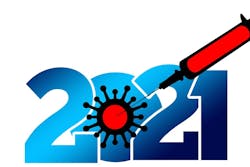Pfizer-BioNTech vaccine neutralizes SARS-CoV-2 variant in study
Pfizer and BioNTech announced results from an in vitro study conducted by Pfizer and the University of Texas Medical Branch (UTMB) that shows the antibodies from people who have received the Pfizer-BioNTech COVID-19 vaccine effectively neutralize SARS-CoV-2 with a mutation that is also found in two highly transmissible strains, according to a press release from Pfizer.
The results were published on the preprint server bioRxiv.
Rapidly spreading variants of SARS-CoV-2, initially reported in the United Kingdom and South Africa, have multiple mutations in their spike or S glycoproteins, which are key targets of virus neutralizing antibodies. Pfizer said that although these two rapidly spreading viruses are different, they share the N501Y mutation, which is located in the receptor binding site of the spike protein and results in the virus’s spike protein binding more tightly to its receptor. It has been shown to infect mice more efficiently.
To determine if sera of people who had received the Pfizer-BioNTech COVID-19 vaccine could neutralize SARS-CoV-2 with the N501Y mutation, a virus with this substitution was generated in UTMB’s laboratory. The sera of 20 participants from the previously reported Phase 3 trial neutralized the virus with the mutation as well as they neutralized virus without the mutation.
While the virus tested in this experiment did not include the full set of spike mutations found on the rapidly spreading strains in the United Kingdom or South Africa, neutralization of virus with the N501Y mutation by the Pfizer- BioNTech vaccine-elicited human sera is consistent with preserved neutralization of a panel of 15 pseudoviruses bearing spikes with other mutations found in circulating SARS-CoV-2 strains, according to Pfizer. The company also said that this indicates that the key N501Y mutation, which is found in the emerging U.K and South Africa variants, does not create resistance to the Pfizer-BioNTech vaccine induced immune responses.

